In Focus This Week
Indian River County Mobile Voter Program
Partnership with local organization leads to success
By M. Mindy Moretti
electionline.org
In 2021, the Florida Legislature passed SB90, which among other things, required mail voters in the Sunshine State to submit a new mail ballot request each General Election cycle – previously mail ballot requests were typically good for two general elections.

Indian River County Mobile Voter Packets.
During the 2022 General Election cycle, Indian River County had 42,000 mail ballot requests on file. On Jan. 1, 2023, all vote-by-mail requests expired as a result of the new legislation.
According to Supervisor of Elections Leslie Swan, as 2023 progressed, the office struggled to motivate voters to renew their mail ballot request. And with the then upcoming 2024 Presidential Election cycle, it was imperative that voters who typically vote-by-mail were made aware of the law change.
Swan said staff brainstormed ways to reach all voters about the law change, but especially the county’s senior voters who may not be as plugged into social and traditional media. From those staff brainstorming sessions came the Mobile Voter Program.
The supervisor of elections team formed a partnership with the Senior Resource Association (SRA) to deliver election information to those who may be homebound or have limited mobility.
The Senior Resource Association is recognized as the lead agency in Indian River County for promoting home and community-based services to older adults and transportation for all. Services offered by the Senior Resource Association include congregate meal sites, Meals on Wheels, Community Coach buses, and the GoLine Public Transportation system.
“By partnering with this remarkable organization, the supervisor of elections team could personally engage those served by the Senior Resource Association,” Swan wrote in her 2024 Professional Practice Paper submission to the Election Center. “During our initial meeting with the Director of the Senior Resource Association, we discussed the different services offered by the SRA and the number of program participants. We estimated that we could reach approximately 1,800 individuals served by SRA.”
Delivering Mobile Voter Packets to a congregate meal site.
The program centered around connecting with traditionally harder-to-reach Indian River County residents by going mobile and providing them with a Mobile Voter Packet. Elections staff assembled 1,800 Mobile Voter Packets. The packets contained a vote-by-mail request form, a voter registration application and return envelope for new voters and those needing to update their voting information, Voter Guide, Government Officials Guide, Frequently Asked Questions brochure, pen, American flag and a sweet treat.
“Reaching eligible voters is crucial, but often, many individuals face barriers to accessing voting information due to lack of mobility or transportation,” Swan wrote in her PPP submission. “By engaging these individuals, it ensures their voices are heard, upholding the democratic principle of inclusivity and representation for all citizens.”
Throughout the early months of 2024, SOE staff were on site for the Senior Resource Association’s Congregate Meal Program, which provides meals five days per week for approximately 300 people at five separate locations throughout the county. All in attendance at the meal sites were provided a Mobile Voter Packet and the opportunity to have their voting questions answered.
 SOE staff also participated in the Meals on Wheels program. Elections staff rode along with the Meals on Wheels volunteers delivering hot lunches to seniors at their homes and providing them with vote-by-mail applications and miscellaneous election information contained in the Mobile Voter Packet. More than 500 informational packets were delivered to homebound individuals.
SOE staff also participated in the Meals on Wheels program. Elections staff rode along with the Meals on Wheels volunteers delivering hot lunches to seniors at their homes and providing them with vote-by-mail applications and miscellaneous election information contained in the Mobile Voter Packet. More than 500 informational packets were delivered to homebound individuals.
Also as part of the ongoing mobile program, supervisor of elections staff traveled on the Senior Resource Association’s GoLine, a no-cost public transit system. The team at the elections office rode on several bus routes, providing riders with SOE contact cards and offering riders the opportunity to renew their vote-by-mail ballot request and even register to vote. Informational signs were displayed inside GoLine buses for riders to view while traveling on the bus. The signs displayed a QR code directing bus riders to renew their vote-by-mail ballot request, register to vote, or update their voter record via the supervisor of elections website.
The Senior Resource Association also operates the Community Coach, a door-to-door transit system for eligible riders with no other means of transportation. Community Coach Drivers distributed more than 1,000 Mobile Voter Packets to riders.
“The Mobile Voter Program represents a proactive and effective solution to the challenges many of our county residents face. I commend the Supervisor of Elections staff for their dedication to fostering greater civic engagement and voter turnout in our community and am confident that their efforts will have a lasting positive impact,” said Karen B. Rose Deigl, president and CEO Senior Resource Association.
The cost of the 1,800 Mobile Voter Packets was $1,582, a per person cost of .88¢. Swan said that while yes, they could have mailed these individuals information about renewing their vote-by-mail request, but the Mobile Voter Packets provided one-on-one interaction and allowed the recipients to feel socially connected.
“By going mobile, voting awareness was personally delivered to our harder-to-reach residents of Indian River County,” Swan said.
Given the small size of the elections office in Indian River, Swan said the partnership with SRA was critical and she advised other counties interested in doing a similar type of outreach to form a solid community partnership.
“The advice that I would give to other counties/jurisdictions would be to identify a community partner who provides services throughout the county. By partnering with this organization, the Elections Office team can target and engage the folks who receive services from the community partner organization,” Swan said. “Community partnerships offer a range of mutual benefits that improve service delivery, build trust, and provide opportunities to reach diverse populations.”
Following the success of the 2024 Mobile Voter Program, Swan said her team at the Indian River County Supervisor of Elections office is currently brainstorming to roll-out another community partnership focusing on the medical field for 2026.
(Indian River County, Florida received the 2024 Stars & Stripes Award from the Election Center for its Mobile Voter Program: A collaboration with the Senior Resource Association.)
electionline Daily News Email
 What’s the best part of waking up? electionline Daily News in your inbox of course so be sure to sign up for your daily dose.
What’s the best part of waking up? electionline Daily News in your inbox of course so be sure to sign up for your daily dose.
Each morning you’ll receive the top headlines of the day, plus a listing of states featured in that day’s news round up.
To sign up, simply visit our site and provide us with your email and you’ll begin receiving the news in your inbox each morning.
We Google so you don’t have to!
Election News This Week
 Federal Update: Sean Plankey, nominee to lead the Cybersecurity and Infrastructure Security Agency, faced sharp questions during a Senate confirmation hearing July 24 about the looming expiration of an information-sharing law and CISA’s work on election security. Plankey — currently a senior adviser to Secretary of Homeland Security Kristi Noem — explained his vision for leading an agency that has experienced major workforce cuts and faces significant budget reductions in the Fiscal Year 2026 spending proposal. According to Cybersecurity Dive, the sharpest exchange of the Senate Homeland Security Committee hearing came when Sen. Richard Blumenthal, D-Connecticut, asked Plankey about the false claims that the 2020 presidential election was “rigged” by Democrats who stole the election. “I have not reviewed any of the cybersecurity of the 2020 election,” Plankey said. When Blumenthal pressed him, Plankey added, “My opinion on the election as an American private citizen is probably not really relevant.” That response angered Blumenthal, who said, “You are the head of the federal agency that oversees the security of our election system for the entire nation, and you’re telling me, in effect … you’re going to evade that responsibility,” Blumenthal added. “I think that answer is completely unsatisfactory.” Plankey pushed back, saying he would maintain CISA’s focus on helping state and local election officials secure their technology. On July 30, the Senate Homeland Security and Governmental Affairs Committee voted 9-6 to advance Plankey’s nomination. The National Association of State Election Directors held their annual summer conference in Oklahoma City last week and the Department of Homeland Security’s Systematic Alien Verification for Entitlements program, which the Administration is urging states to use for citizenship verification, was a topic of discussion. David Jennings, who oversees policy and technology operations for the SAVE program, addressed the state election directors. According to Votebeat, Jennings told election officials that SAVE does not store citizenship and immigration information in a centralized database. Rather, he said, it’s a search tool that “queries information for a person from 10 to 15 databases across the federal government.” Several more states – Illinois, Maine, Minnesota, and Utah – reported receiving requests from the U.S. Department of Justice for access to voter and election data.
Federal Update: Sean Plankey, nominee to lead the Cybersecurity and Infrastructure Security Agency, faced sharp questions during a Senate confirmation hearing July 24 about the looming expiration of an information-sharing law and CISA’s work on election security. Plankey — currently a senior adviser to Secretary of Homeland Security Kristi Noem — explained his vision for leading an agency that has experienced major workforce cuts and faces significant budget reductions in the Fiscal Year 2026 spending proposal. According to Cybersecurity Dive, the sharpest exchange of the Senate Homeland Security Committee hearing came when Sen. Richard Blumenthal, D-Connecticut, asked Plankey about the false claims that the 2020 presidential election was “rigged” by Democrats who stole the election. “I have not reviewed any of the cybersecurity of the 2020 election,” Plankey said. When Blumenthal pressed him, Plankey added, “My opinion on the election as an American private citizen is probably not really relevant.” That response angered Blumenthal, who said, “You are the head of the federal agency that oversees the security of our election system for the entire nation, and you’re telling me, in effect … you’re going to evade that responsibility,” Blumenthal added. “I think that answer is completely unsatisfactory.” Plankey pushed back, saying he would maintain CISA’s focus on helping state and local election officials secure their technology. On July 30, the Senate Homeland Security and Governmental Affairs Committee voted 9-6 to advance Plankey’s nomination. The National Association of State Election Directors held their annual summer conference in Oklahoma City last week and the Department of Homeland Security’s Systematic Alien Verification for Entitlements program, which the Administration is urging states to use for citizenship verification, was a topic of discussion. David Jennings, who oversees policy and technology operations for the SAVE program, addressed the state election directors. According to Votebeat, Jennings told election officials that SAVE does not store citizenship and immigration information in a centralized database. Rather, he said, it’s a search tool that “queries information for a person from 10 to 15 databases across the federal government.” Several more states – Illinois, Maine, Minnesota, and Utah – reported receiving requests from the U.S. Department of Justice for access to voter and election data.
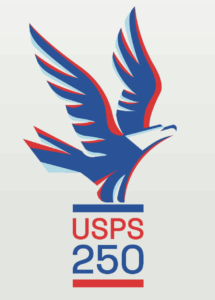 U.S. Postal Service News: A year before the United States turns 250, the U.S. Postal Service recently celebrated its 250th anniversary. On July 26, 1775, members of the Second Continental Congress appointed Benjamin Franklin the first American Postmaster General at a meeting in Philadelphia. The Postal Service has grown from serving the 13 colonies to delivering more mail than any other postal system in the world, reaching nearly 169 million addresses and employing more than 635,000 people. The Postal Service moves mail by planes, hovercraft, trains, trucks, cars, boats, ferries, helicopters, subways, bicycles, mules and feet with an average of 371.3 million mailpieces being processed and delivered each day. The Postal Service and elections have a long history with vote by mail starting with Civil War soldiers. In 2024, 99.22 million ballots were processed in the General Election with 97.73% of ballots delivered from voters to election officials within three days. To celebrate 250 years, USPS even has an election of sorts happening. From now till Sept. 30 people can vote for a retired stamp to bring back! You can even vote by mail for your favorite stamp. By the way, did you know you can write an address on a potato (or coconut or pumpkin), have it weighed and pay for the postage and you can just mail it…no box or bag necessary?! That’s just one of a lot of fun facts you can find out about the Postal Service.
U.S. Postal Service News: A year before the United States turns 250, the U.S. Postal Service recently celebrated its 250th anniversary. On July 26, 1775, members of the Second Continental Congress appointed Benjamin Franklin the first American Postmaster General at a meeting in Philadelphia. The Postal Service has grown from serving the 13 colonies to delivering more mail than any other postal system in the world, reaching nearly 169 million addresses and employing more than 635,000 people. The Postal Service moves mail by planes, hovercraft, trains, trucks, cars, boats, ferries, helicopters, subways, bicycles, mules and feet with an average of 371.3 million mailpieces being processed and delivered each day. The Postal Service and elections have a long history with vote by mail starting with Civil War soldiers. In 2024, 99.22 million ballots were processed in the General Election with 97.73% of ballots delivered from voters to election officials within three days. To celebrate 250 years, USPS even has an election of sorts happening. From now till Sept. 30 people can vote for a retired stamp to bring back! You can even vote by mail for your favorite stamp. By the way, did you know you can write an address on a potato (or coconut or pumpkin), have it weighed and pay for the postage and you can just mail it…no box or bag necessary?! That’s just one of a lot of fun facts you can find out about the Postal Service.
 News from NASED: The National Association of State Election Directors (NASED) announced that the Montana Secretary of State’s office is the recipient of the 2025 NASED Innovators Award for the agency’s Death of a Loved One initiative, which better enables voter registration list maintenance in Montana upon the death of a registered voter. Montana was selected out of submissions from 12 states. Before this year, Montana state law offered three ways to cancel the voter registration record of a deceased voter: quarterly vital statistics reports; an obituary published in a physical newspaper; and a death certificate provided to an election office. To expedite the receipt of information on deceased voters, in 2024 the Montana Secretary of State’s office partnered with the Montana Funeral Directors Association to create and distribute an informational pamphlet to provide to families at funeral homes. The pamphlet provides step-by-step instructions for canceling a deceased voter’s registration. For election officials, this provides an opportunity to update the voter registration list months or sometimes years before state or federal vital records information is available to them. A second pillar of the program, which was not considered in scoring due to the Award’s timing criteria, was the passage of legislation spearheaded by the Secretary’s office in early 2025 to permit the usage of online obituaries as a mechanism to cancel a voter registration record. NASED President Bryan Caskey said: “On behalf of NASED, I am proud to present the 2025 NASED Innovators Award to the Montana Secretary of State’s office for their Death of Loved One initiative. Though we all approach it differently, voter registration list maintenance is a responsibility every election official in every state and territory takes seriously. It is an integral part of our jobs: accurate rolls contribute to voter trust in the election process and allow election officials to more efficiently deploy resources, from printing the right number of ballots to having enough voting equipment and election workers. I am proud to recognize Montana’s innovation and creativity – this is exactly the kind of effort we hope to encourage among our members.” Director of Elections and Chief Legal Counsel for the Montana Secretary of State Austin James said: “Montana set a goal to be a national leader in election integrity. We are honored that our effort to innovate and make Montana’s voter rolls the cleanest in the country is being recognized by election leaders from around the country.”
News from NASED: The National Association of State Election Directors (NASED) announced that the Montana Secretary of State’s office is the recipient of the 2025 NASED Innovators Award for the agency’s Death of a Loved One initiative, which better enables voter registration list maintenance in Montana upon the death of a registered voter. Montana was selected out of submissions from 12 states. Before this year, Montana state law offered three ways to cancel the voter registration record of a deceased voter: quarterly vital statistics reports; an obituary published in a physical newspaper; and a death certificate provided to an election office. To expedite the receipt of information on deceased voters, in 2024 the Montana Secretary of State’s office partnered with the Montana Funeral Directors Association to create and distribute an informational pamphlet to provide to families at funeral homes. The pamphlet provides step-by-step instructions for canceling a deceased voter’s registration. For election officials, this provides an opportunity to update the voter registration list months or sometimes years before state or federal vital records information is available to them. A second pillar of the program, which was not considered in scoring due to the Award’s timing criteria, was the passage of legislation spearheaded by the Secretary’s office in early 2025 to permit the usage of online obituaries as a mechanism to cancel a voter registration record. NASED President Bryan Caskey said: “On behalf of NASED, I am proud to present the 2025 NASED Innovators Award to the Montana Secretary of State’s office for their Death of Loved One initiative. Though we all approach it differently, voter registration list maintenance is a responsibility every election official in every state and territory takes seriously. It is an integral part of our jobs: accurate rolls contribute to voter trust in the election process and allow election officials to more efficiently deploy resources, from printing the right number of ballots to having enough voting equipment and election workers. I am proud to recognize Montana’s innovation and creativity – this is exactly the kind of effort we hope to encourage among our members.” Director of Elections and Chief Legal Counsel for the Montana Secretary of State Austin James said: “Montana set a goal to be a national leader in election integrity. We are honored that our effort to innovate and make Montana’s voter rolls the cleanest in the country is being recognized by election leaders from around the country.”
 Podcast News: Two Bowdoin College students have recently launched “Pine State Politics: In Session”, where they learn and educate listeners about basic civic processes, like how a bill becomes a law, the difference between state and federal government, the role of lobbyists and much more from some of the biggest names in Maine politics. “A lot of young people want to get involved, but don’t know how,” Bowdoin sophomore Natalie Emmerson said of the political process. “That’s exactly what the point of the podcast is. We’re digging into the mechanics of how everything works.” Her classmate and podcast co-host Larsen Van Horn, who is from out of state, said the podcast is a way for him to learn more about how Maine’s government and elections work, for instance, concepts like ranked-choice voting and clean elections funding.
Podcast News: Two Bowdoin College students have recently launched “Pine State Politics: In Session”, where they learn and educate listeners about basic civic processes, like how a bill becomes a law, the difference between state and federal government, the role of lobbyists and much more from some of the biggest names in Maine politics. “A lot of young people want to get involved, but don’t know how,” Bowdoin sophomore Natalie Emmerson said of the political process. “That’s exactly what the point of the podcast is. We’re digging into the mechanics of how everything works.” Her classmate and podcast co-host Larsen Van Horn, who is from out of state, said the podcast is a way for him to learn more about how Maine’s government and elections work, for instance, concepts like ranked-choice voting and clean elections funding.
 Sticker News: Our cup runneth over this week with sticker news! Congratulations to Guadalupe County, Texas students Julianna Sheridan and Laila Shaheed for winning first place in the county’s “I Voted” and “Future Voter” sticker contests. “The Guadalupe County Elections Office held our first annual ‘I Voted’ and ‘Future Voters’ sticker contests. We were hoping to engage the community and the people of the county,” County Elections
Sticker News: Our cup runneth over this week with sticker news! Congratulations to Guadalupe County, Texas students Julianna Sheridan and Laila Shaheed for winning first place in the county’s “I Voted” and “Future Voter” sticker contests. “The Guadalupe County Elections Office held our first annual ‘I Voted’ and ‘Future Voters’ sticker contests. We were hoping to engage the community and the people of the county,” County Elections 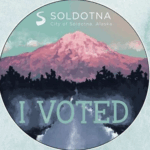 Administrator Lisa Hayes said. “We were really excited to have a turnout we thought was great” From April 23 to June 13, the contest was open to children 18 and younger enrolled in Guadalupe County schools or homeschooled in Guadalupe County, according to the official rules. Contestants submitted their original artwork amid stipulated rules before a panel of judges rated the voting-themed pieces. The top winner in each contest will have their design on stickers distributed in the 2025-2026 election cycle. “Seeing all the creativity and passion these students brought to their
Administrator Lisa Hayes said. “We were really excited to have a turnout we thought was great” From April 23 to June 13, the contest was open to children 18 and younger enrolled in Guadalupe County schools or homeschooled in Guadalupe County, according to the official rules. Contestants submitted their original artwork amid stipulated rules before a panel of judges rated the voting-themed pieces. The top winner in each contest will have their design on stickers distributed in the 2025-2026 election cycle. “Seeing all the creativity and passion these students brought to their 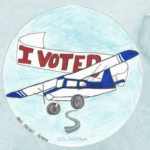 designs was exciting,” Hayes said. “We are thrilled to feature their work on our official voter stickers, as it is a great way to celebrate civic engagement at every age.” Winners were named for the Second Annual City of Soldotna, Alaska “I Voted” sticker design contest. The set of community-created voting stickers will be available at Soldotna polling locations during the Oct. 1 municipal election. Lily, a 16-year-old IDEA Homeschool student, won the youth category with her image of a plane carrying an “I Voted” banner. Trinity Godfrey won the adult prize with her design of a mountain rising above spruce trees and the Kenai River. Kenai Peninsula artists across three categories — “Future
designs was exciting,” Hayes said. “We are thrilled to feature their work on our official voter stickers, as it is a great way to celebrate civic engagement at every age.” Winners were named for the Second Annual City of Soldotna, Alaska “I Voted” sticker design contest. The set of community-created voting stickers will be available at Soldotna polling locations during the Oct. 1 municipal election. Lily, a 16-year-old IDEA Homeschool student, won the youth category with her image of a plane carrying an “I Voted” banner. Trinity Godfrey won the adult prize with her design of a mountain rising above spruce trees and the Kenai River. Kenai Peninsula artists across three categories — “Future 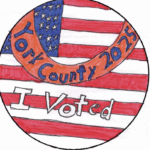 Voter,” youth and adult — last month submitted their designs for the stickers. A panel of judges considered all the designs and decided three finalists for each age group. The winners were chosen in a public election available on the city’s website. The Cultural Alliance of York County (CAYC) and York County, Pennsylvania announced this week that Christopher Dasir, a fifth grade student at Logos Academy, had won the competition. Christopher’s design will be printed on two-inch commemorative stickers
Voter,” youth and adult — last month submitted their designs for the stickers. A panel of judges considered all the designs and decided three finalists for each age group. The winners were chosen in a public election available on the city’s website. The Cultural Alliance of York County (CAYC) and York County, Pennsylvania announced this week that Christopher Dasir, a fifth grade student at Logos Academy, had won the competition. Christopher’s design will be printed on two-inch commemorative stickers 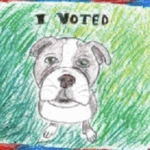 and be used at polling places across York County for the general election on Nov. 4, 2025 and the May 19, 2026 primary. The competition was decided by a panel of local educators, artists and a Judge of Election. Officials say that the selection was based on whether the artwork “uniquely represented York County” and remained readable at a small scale. The Tompkins County, New York Board of Elections has announced winners in the annual voting sticker contest. Boynton Middle School 7th grader Olivia Casselberry won for her “I Voted” design, while Belle
and be used at polling places across York County for the general election on Nov. 4, 2025 and the May 19, 2026 primary. The competition was decided by a panel of local educators, artists and a Judge of Election. Officials say that the selection was based on whether the artwork “uniquely represented York County” and remained readable at a small scale. The Tompkins County, New York Board of Elections has announced winners in the annual voting sticker contest. Boynton Middle School 7th grader Olivia Casselberry won for her “I Voted” design, while Belle 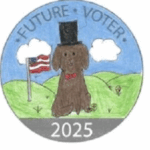
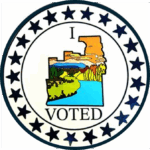 Sherman Elementary 4th grader Sevy Stiglitz took home the honors for her “Future Voter” artwork. “Congratulations to both students for their amazing artwork and to everyone who participated in the contests this year,” stated Republican Elections Commissioner Alanna Congdon. “The Board of Elections is so proud to be able to encourage civic engagement in this way.” The BOE received 67 submissions this year, and
Sherman Elementary 4th grader Sevy Stiglitz took home the honors for her “Future Voter” artwork. “Congratulations to both students for their amazing artwork and to everyone who participated in the contests this year,” stated Republican Elections Commissioner Alanna Congdon. “The Board of Elections is so proud to be able to encourage civic engagement in this way.” The BOE received 67 submissions this year, and  nearly 1,300 people cast votes. And while we posted about the Tioga County, New York “I Voted” sticker contest winners last week, we didn’t have images of them, but we’re in luck this week thanks to Republican Election Commissioner Kelly Johnson and Democratic Election Commissioner James Wahls for answering our email and getting us these great images to share.
nearly 1,300 people cast votes. And while we posted about the Tioga County, New York “I Voted” sticker contest winners last week, we didn’t have images of them, but we’re in luck this week thanks to Republican Election Commissioner Kelly Johnson and Democratic Election Commissioner James Wahls for answering our email and getting us these great images to share.
Personnel News: Nathan Bugg has been hired as the administrator of elections for Jefferson County, Tennessee. Leigh Phillips has been sworn in as the Henry County, Georgia elections supervisor. Davidson County, Tennessee Election Administrator Jeff Roberts has announced he is retiring at the end of the year. Kirk Stephens is retiring from the Jackson County, North Carolina board of elections. Orange County Supervisor Don Wagner announced that he’s running for California’s secretary of state. Rep. Ken Rahjes (R-Phillipsburg) officially filed as a Republican candidate for Kansas secretary of state. Congratulations to M. Lynne West, Director of Voter Registration and Elections for Laurens County, for being named the South Carolina Association of Registration and Election Officials (SCARE) recipient of the 2025 Moore Award, the highest honor presented by the association. The Moore Award is awarded annually to a member of SCARE who best exemplifies the spirit of the organization through selfless dedication and a commitment to strengthening election administration across South Carolina.“Lynne’s steadfast commitment to supporting and empowering all election officials truly embodies the spirit of the Moore Award”, said Isaac Cramer, SCARE President. “Her countless acts of service make her a most deserving recipient, strengthening our organization and advancing its mission.,”
New Research & Reports
 Noncitizens Voting: In recent months, policymakers and the media have devoted much attention to claims that large numbers of noncitizens are registered or have voted in recent elections. However, comparatively little attention has been paid to the painstaking efforts undertaken by election officials and other government bodies in every state to thoroughly investigate these claims. Available evidence suggests that, once under scrutiny, the number of alleged instances falls drastically. Despite the heightened national awareness and concern brought about by these allegations, it appears that there has been no systematic nationwide effort to analyze them to date. The Center for Election Innovation & Research (CEIR) conducted a rigorous search, analyzing government, media, and other public sources in all fifty states to compile an expansive list of allegations of noncitizen registration and voting, as well as the results of official investigations into such allegations. The resulting compilation reveals several notable insights, including:
Noncitizens Voting: In recent months, policymakers and the media have devoted much attention to claims that large numbers of noncitizens are registered or have voted in recent elections. However, comparatively little attention has been paid to the painstaking efforts undertaken by election officials and other government bodies in every state to thoroughly investigate these claims. Available evidence suggests that, once under scrutiny, the number of alleged instances falls drastically. Despite the heightened national awareness and concern brought about by these allegations, it appears that there has been no systematic nationwide effort to analyze them to date. The Center for Election Innovation & Research (CEIR) conducted a rigorous search, analyzing government, media, and other public sources in all fifty states to compile an expansive list of allegations of noncitizen registration and voting, as well as the results of official investigations into such allegations. The resulting compilation reveals several notable insights, including:
- No “apples to apples” comparisons: Allegations about noncitizen registration and voting vary significantly across states and with respect to major factors, including the methodology and level of evidence on which the allegations are based. For example, some states announce the number of records flagged by cursory reviews for possible noncitizen registrants, while other states only publish the number of records removed after a thorough investigation. The latter numbers are invariably far smaller. This methodological inconsistency not only contributes to the confusion in public discourse, but it also restricts this analysis to discussing only broad trends.
- Scrutiny almost always shrinks claims: High-profile claims of large numbers are highly likely to be significantly revised down after proper investigation and scrutiny. Often, these investigations reveal that initial claims were based at least in part on outdated, incomplete, or improperly matched data. However, the smaller numbers that result from these investigations generally receive far less public attention.
- Claims represent tiny fractions of voters: Even the largest claims never allege numbers that amount to more than a few tenths of a percent of the number of eligible voters in a state. This indicates that existing safeguards are broadly effective, allowing election officials and other authorities to focus on investigating a relatively small number of records where there are alleged concerns.
Ballot Measures, Legislation & Rulemaking
 Federal Legislation: Senate Democrats reintroduced a bill July 29 to restore and expand protections enshrined in the Voting Rights Act of 1965, their latest long-shot attempt to revive the landmark law just days before its 60th anniversary and at a time of renewed debate over the future administration of American elections. Sen. Raphael Warnock (D-Georgia) unveiled the measure, titled the John R. Lewis Voting Rights Advancement Act, with the backing of Democratic leaders. The bill stands little chance of passage in the Republican-led Congress, but it provides the clearest articulation of Democrats’ agenda on voting rights and election reform. The legislation would reestablish and expand the requirement that states and localities with a history of discrimination get federal approval before changing their voting laws. It would also require states to allow same-day voter registration, prevent voters from being purged from voter rolls if they miss elections and allow people who may have been disenfranchised at the ballot box to seek a legal remedy in the courts. Democrats first introduced the updated Voting Rights Act in 2021, when the party had unified control of Congress. The bill came in response to several years of states enacting restrictive voting laws following the Supreme Court’s 2013 ruling in Shelby County v. Holder. The bill passed the House twice in that Congress but failed to pass the 60-vote filibuster threshold in the Senate. Rep. Terri Sewell of Alabama reintroduced a House version in March.
Federal Legislation: Senate Democrats reintroduced a bill July 29 to restore and expand protections enshrined in the Voting Rights Act of 1965, their latest long-shot attempt to revive the landmark law just days before its 60th anniversary and at a time of renewed debate over the future administration of American elections. Sen. Raphael Warnock (D-Georgia) unveiled the measure, titled the John R. Lewis Voting Rights Advancement Act, with the backing of Democratic leaders. The bill stands little chance of passage in the Republican-led Congress, but it provides the clearest articulation of Democrats’ agenda on voting rights and election reform. The legislation would reestablish and expand the requirement that states and localities with a history of discrimination get federal approval before changing their voting laws. It would also require states to allow same-day voter registration, prevent voters from being purged from voter rolls if they miss elections and allow people who may have been disenfranchised at the ballot box to seek a legal remedy in the courts. Democrats first introduced the updated Voting Rights Act in 2021, when the party had unified control of Congress. The bill came in response to several years of states enacting restrictive voting laws following the Supreme Court’s 2013 ruling in Shelby County v. Holder. The bill passed the House twice in that Congress but failed to pass the 60-vote filibuster threshold in the Senate. Rep. Terri Sewell of Alabama reintroduced a House version in March.
 District of Columbia: During this week’s vote on the upcoming budget, several amendments focused on whether Initiative 83 would be fully or partially funded. The initiative was approved by voters last year and called for ranked choice voting and open primaries in D.C. Ahead of the first vote, the council agreed to fund half the measure, allowing for ranked choice voting but not open primaries. The system allows voters to rank more than one candidate on a ballot. At-large Council member Anita Bonds and Ward 5 Council member Zachary Parker were among those who proposed amendments that opted for studying how to set up ranked choice voting before choosing to pay to implement it. Ward 2 Council member Brooke Pinto introduced one amendment that would have fully funded Initiative 83. “Just two weeks ago, we implemented the first half of Initiative 83 with a supermajority of us. This amendment just seeks to implement the other half of ranked choice voting, as was passed by 73% of D.C. voters, to have semi-open primaries, to allow independents to vote in our primary system,” Pinto said. However, the measure failed.
District of Columbia: During this week’s vote on the upcoming budget, several amendments focused on whether Initiative 83 would be fully or partially funded. The initiative was approved by voters last year and called for ranked choice voting and open primaries in D.C. Ahead of the first vote, the council agreed to fund half the measure, allowing for ranked choice voting but not open primaries. The system allows voters to rank more than one candidate on a ballot. At-large Council member Anita Bonds and Ward 5 Council member Zachary Parker were among those who proposed amendments that opted for studying how to set up ranked choice voting before choosing to pay to implement it. Ward 2 Council member Brooke Pinto introduced one amendment that would have fully funded Initiative 83. “Just two weeks ago, we implemented the first half of Initiative 83 with a supermajority of us. This amendment just seeks to implement the other half of ranked choice voting, as was passed by 73% of D.C. voters, to have semi-open primaries, to allow independents to vote in our primary system,” Pinto said. However, the measure failed.
 Michigan Ballot Measure: Republican activists and officials from across Michigan gathered Wednesday to launch a ballot initiative to ensure that only American citizens are voting in local, statewide and national elections. The Americans for Citizen Voting initiative was recently approved by the Michigan Board of State Canvassers, and on Wednesday the effort kicked off its signature gathering campaign with the aim of getting the constitutional amendment on the 2026 general election ballot. The measure would require all voters to show a photo identification in order to cast a ballot. A big issue surrounding the debate on voter ID is the potential barrier such a requirement could place on those who don’t have ID readily available or those who might not be able to afford it. Organizers have anticipated that talking point, and the measure would provide free ID cards for those facing hardships. The initiative would also establish that the secretary of state must verify that only U.S. citizens are registered to vote, and mandate that the Michigan Department of State regularly review and purge voter rolls of individuals whose citizenship status cannot be verified. Supporters and organizers will need more than 440,000 valid signatures to get the measure on the ballot.
Michigan Ballot Measure: Republican activists and officials from across Michigan gathered Wednesday to launch a ballot initiative to ensure that only American citizens are voting in local, statewide and national elections. The Americans for Citizen Voting initiative was recently approved by the Michigan Board of State Canvassers, and on Wednesday the effort kicked off its signature gathering campaign with the aim of getting the constitutional amendment on the 2026 general election ballot. The measure would require all voters to show a photo identification in order to cast a ballot. A big issue surrounding the debate on voter ID is the potential barrier such a requirement could place on those who don’t have ID readily available or those who might not be able to afford it. Organizers have anticipated that talking point, and the measure would provide free ID cards for those facing hardships. The initiative would also establish that the secretary of state must verify that only U.S. citizens are registered to vote, and mandate that the Michigan Department of State regularly review and purge voter rolls of individuals whose citizenship status cannot be verified. Supporters and organizers will need more than 440,000 valid signatures to get the measure on the ballot.
 North Carolina: A new bill moving forward in the state legislature would allow state election officials to be hired or fired for political reasons for the first time in modern history, allow foreigners to make some political donations, ban ranked-choice voting and explore using AI-based signature verification software to throw out people’s ballots in future elections. The wide-ranging bill contains a mixture of requests from conservative activists, Republican state lawmakers and the newly Republican-led State Board of Elections, which came under GOP control this spring after the legislature stripped Democratic Gov. Josh Stein’s power to appoint a majority of election board members. Several of the changes in the new bill are aimed at allowing that new GOP majority on the board to flex its political muscles ahead of the 2026 elections, in part by removing the legal protections that State Elections Board staffers have long had against political motivations behind them being hired or fired, or otherwise receiving rewards or retribution. The bill would also exempt the elections board from some public records laws. And it would allow the board to hire private attorneys for lawsuits instead of using state government lawyers from the attorney general’s office.
North Carolina: A new bill moving forward in the state legislature would allow state election officials to be hired or fired for political reasons for the first time in modern history, allow foreigners to make some political donations, ban ranked-choice voting and explore using AI-based signature verification software to throw out people’s ballots in future elections. The wide-ranging bill contains a mixture of requests from conservative activists, Republican state lawmakers and the newly Republican-led State Board of Elections, which came under GOP control this spring after the legislature stripped Democratic Gov. Josh Stein’s power to appoint a majority of election board members. Several of the changes in the new bill are aimed at allowing that new GOP majority on the board to flex its political muscles ahead of the 2026 elections, in part by removing the legal protections that State Elections Board staffers have long had against political motivations behind them being hired or fired, or otherwise receiving rewards or retribution. The bill would also exempt the elections board from some public records laws. And it would allow the board to hire private attorneys for lawsuits instead of using state government lawyers from the attorney general’s office.
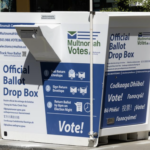 Multnomah County, Oregon: The Multnomah County Commissioners have approved a change to the way elections are run in the county. The commissioners were presented July 24 with a proposal to move to a ranked-choice voting system for the midterm election in 2026. The director of elections in the county says this would simplify voting for Oregonians living in Multnomah County because it is already how Portland runs its city candidate elections. The commissioners voted unanimously to move the county to a ranked-choice system, so midterm ballots will look a little different in 2026.
Multnomah County, Oregon: The Multnomah County Commissioners have approved a change to the way elections are run in the county. The commissioners were presented July 24 with a proposal to move to a ranked-choice voting system for the midterm election in 2026. The director of elections in the county says this would simplify voting for Oregonians living in Multnomah County because it is already how Portland runs its city candidate elections. The commissioners voted unanimously to move the county to a ranked-choice system, so midterm ballots will look a little different in 2026.
 Texas: The Senate voted 17-12 this week to preliminarily approve a bill that would allow the attorney general to independently prosecute election crimes without waiting to be invited by a local district attorney, a long-standing priority for the office’s GOP incumbent, Ken Paxton. A similar proposal stalled out just before the finish line during the regular session, with the House and Senate unable to agree on how quickly the attorney general should be allowed to take the case from local authorities. This time around, both chambers are starting from the same spot on that issue, directing the attorney general to immediately step in and take over election fraud cases. But a potential new line of disagreement has opened. In setting the agenda for the Legislature’s ongoing special session, Gov. Greg Abbott asked lawmakers to grant this authority to the attorney general with a constitutional amendment, after Texas’ highest criminal court ruled in 2021 that the state constitution bars the agency from unilaterally inserting itself into criminal cases. A constitutional amendment requires a two-thirds vote from both chambers — including 12 House Democrats — and final signoff from voters to take effect. In the House, Plano GOP Rep. Matt Shaheen took up that call, filing a joint resolution to accompany his bill. Sen. Bryan Hughes, the Mineola Republican carrying the Senate version of the bill, said during a hearing he does not believe a constitutional amendment is necessary.
Texas: The Senate voted 17-12 this week to preliminarily approve a bill that would allow the attorney general to independently prosecute election crimes without waiting to be invited by a local district attorney, a long-standing priority for the office’s GOP incumbent, Ken Paxton. A similar proposal stalled out just before the finish line during the regular session, with the House and Senate unable to agree on how quickly the attorney general should be allowed to take the case from local authorities. This time around, both chambers are starting from the same spot on that issue, directing the attorney general to immediately step in and take over election fraud cases. But a potential new line of disagreement has opened. In setting the agenda for the Legislature’s ongoing special session, Gov. Greg Abbott asked lawmakers to grant this authority to the attorney general with a constitutional amendment, after Texas’ highest criminal court ruled in 2021 that the state constitution bars the agency from unilaterally inserting itself into criminal cases. A constitutional amendment requires a two-thirds vote from both chambers — including 12 House Democrats — and final signoff from voters to take effect. In the House, Plano GOP Rep. Matt Shaheen took up that call, filing a joint resolution to accompany his bill. Sen. Bryan Hughes, the Mineola Republican carrying the Senate version of the bill, said during a hearing he does not believe a constitutional amendment is necessary.
Legal Updates
 Arizona: Superior Court Judge Melissa Julian ruled that the public does not have the right to inspect the cast vote record, documentation detailing every vote cast in an election. The cast vote record is created by ballot counting machines and includes details about how people voted with other information, like “precinct, whether the ballot was adjudicated, and the completeness of the voter’s markings,” according to court records. The record does not include voter names or other personal identification information included on ballots. However, in some cases, information included in the cast vote record could be used to piece together information and determine a voter’s identity. In court documents, Maricopa County argued Arizona law prevents counties from disclosing the cast vote record. Julian agreed. In an order signed last week, Julian found that state election law exempts the cast vote record from Arizona’s Public Records Law, which allows the public to inspect most government records in the state. She cited a law that requires election officials to ensure the security measures used to secure “electronic data from and digital images of ballots…are at least as protective as those prescribed for paper ballots.” “CVRs, which reflect how each ballot was tabulated, are electronically derived from voters’ marked ballots. As such, they are explicitly covered by section 16-625 and cannot be disclosed to members of the public through a public records request,” Julian wrote. The judge found that the county should not have disclosed the record in the past. “The County acknowledges that it previously disclosed CVRs from the 2020 election, and that those prior CVRs are available through third-party repositories,” Julian wrote. “However, the fact that prior disclosures may have occurred in contravention of section 16-625 does not render the statute unenforceable or justify new violations.”
Arizona: Superior Court Judge Melissa Julian ruled that the public does not have the right to inspect the cast vote record, documentation detailing every vote cast in an election. The cast vote record is created by ballot counting machines and includes details about how people voted with other information, like “precinct, whether the ballot was adjudicated, and the completeness of the voter’s markings,” according to court records. The record does not include voter names or other personal identification information included on ballots. However, in some cases, information included in the cast vote record could be used to piece together information and determine a voter’s identity. In court documents, Maricopa County argued Arizona law prevents counties from disclosing the cast vote record. Julian agreed. In an order signed last week, Julian found that state election law exempts the cast vote record from Arizona’s Public Records Law, which allows the public to inspect most government records in the state. She cited a law that requires election officials to ensure the security measures used to secure “electronic data from and digital images of ballots…are at least as protective as those prescribed for paper ballots.” “CVRs, which reflect how each ballot was tabulated, are electronically derived from voters’ marked ballots. As such, they are explicitly covered by section 16-625 and cannot be disclosed to members of the public through a public records request,” Julian wrote. The judge found that the county should not have disclosed the record in the past. “The County acknowledges that it previously disclosed CVRs from the 2020 election, and that those prior CVRs are available through third-party repositories,” Julian wrote. “However, the fact that prior disclosures may have occurred in contravention of section 16-625 does not render the statute unenforceable or justify new violations.”
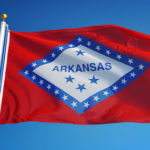 Arkansas: The 8th Circuit Court of Appeals on Monday ruled that private individuals and organizations cannot bring voting rights cases under a section of the law that allows others to assist voters who are blind, have disabilities or are unable to read. It’s the latest ruling from the 8th Circuit, saying only the government can bring lawsuits alleging violations of the Voting Rights Act. The findings upend decades of precedent and will likely be headed to the U.S. Supreme Court. The case centered on whether an Arkansas law that limits how many voters can be assisted by one person conflicts with Section 208 of the landmark federal law. The opinion from the three-judge panel followed the reasoning of another 8th Circuit panel in a previous case from 2023. That opinion held that the Arkansas State Conference NAACP and the Arkansas Public Policy Conference could not bring cases under Section 2 of the Voting Rights Act. “Like the provision at issue in Arkansas State Conference, we conclude the text and structure of (Section) 208 do not create a private right of action,” said the decision written by Judge L. Steven Grasz, a nominee of President Donald Trump. “Likewise, we conclude no private right of action is created by the Supremacy Clause.”
Arkansas: The 8th Circuit Court of Appeals on Monday ruled that private individuals and organizations cannot bring voting rights cases under a section of the law that allows others to assist voters who are blind, have disabilities or are unable to read. It’s the latest ruling from the 8th Circuit, saying only the government can bring lawsuits alleging violations of the Voting Rights Act. The findings upend decades of precedent and will likely be headed to the U.S. Supreme Court. The case centered on whether an Arkansas law that limits how many voters can be assisted by one person conflicts with Section 208 of the landmark federal law. The opinion from the three-judge panel followed the reasoning of another 8th Circuit panel in a previous case from 2023. That opinion held that the Arkansas State Conference NAACP and the Arkansas Public Policy Conference could not bring cases under Section 2 of the Voting Rights Act. “Like the provision at issue in Arkansas State Conference, we conclude the text and structure of (Section) 208 do not create a private right of action,” said the decision written by Judge L. Steven Grasz, a nominee of President Donald Trump. “Likewise, we conclude no private right of action is created by the Supremacy Clause.”
Two ballot question committees asked the court to block six Arkansas laws regulating direct democracy, one day after a federal judge granted them permission to intervene in an existing lawsuit. The original suit, brought by the League of Women Voters of Arkansas, challenges the constitutionality of state laws governing the petition and referendum process. The League also is gathering signatures to qualify its proposed ballot measure for the 2026 ballot. The League and Protect AR Rights, one of two ballot question committees intervening in the suit, are both pursuing ballot measures aimed at protecting Arkansans’ right to direct democracy. Protect AR Rights and For AR Kids, a ballot question committee pursuing an education-related ballot measure, filed a complaint, motion for preliminary injunction and brief in support of the motion Thursday. The coalitions requested a hearing on the motion, a preliminary injunction to block the laws and an order requiring the secretary of state to count and verify any otherwise legally valid signatures that don’t comply with the challenged laws. The laws the groups are asking a judge to block are:
- Act 218 of 2025, which requires signature gatherers (canvassers) to inform potential signers that petition fraud is a criminal offense.
- Act 240 of 2025, which requires canvassers to request a photo ID from potential signers.
- Act 274 of 2025, which requires potential signers to read a petition’s ballot title or have it read to them; failure to ensure this would result in a misdemeanor charge against the canvasser.
- Act 602 of 2025, which prohibits ballot titles from being written above an eighth-grade reading level.
- Act 236 of 2023, which requires petition signatures be gathered from 50 counties (up from 15 counties).
- Ark. Code Ann. § 7-9- 601(a)(2)(C), which requires a ballot initiative sponsor to provide the secretary of state the name and address of paid canvassers before they solicit any signatures; and the associated Ark. Code Ann. § 7-9-126(b)(4), which provides that, if the sponsor fails to provide this information, the signatures the paid canvasser collected won’t count.
Protect AR Rights and For AR Kids argue in their 56-page complaint that the state laws infringe on their First and Fourteenth Amendment rights.
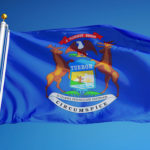 Michigan: Michigan Court of Claims Judge Sima Patel ordered mediation in the lawsuit the Michigan House filed against Secretary of State Jocelyn Benson over subpoenas to obtain training materials for election administrators, the release of which Benson fears could compromise election security. Benson has provided some of the material sought by the Republican-led Michigan House Oversight Committee but has expressed concerns that some of the information requested could end up in the wrong hands. The House filed its lawsuit against Benson in June, arguing that they have a right to review the material to ensure that election officials receive proper training that complies with Michigan election law. Patel ordered the parties in the case to appear for mediation with Court of Claims Judge James Robert Redford, requiring Benson and House Speaker Matt Hall, R-Richland, to attend unless they have a valid excuse. The order followed a July 22 hearing during which Patel made the ruling from the bench. Two weeks before the mediation conference, the parties in the case must list the remaining materials subpoenaed that the Secretary of State’s office hasn’t delivered with a description of each.
Michigan: Michigan Court of Claims Judge Sima Patel ordered mediation in the lawsuit the Michigan House filed against Secretary of State Jocelyn Benson over subpoenas to obtain training materials for election administrators, the release of which Benson fears could compromise election security. Benson has provided some of the material sought by the Republican-led Michigan House Oversight Committee but has expressed concerns that some of the information requested could end up in the wrong hands. The House filed its lawsuit against Benson in June, arguing that they have a right to review the material to ensure that election officials receive proper training that complies with Michigan election law. Patel ordered the parties in the case to appear for mediation with Court of Claims Judge James Robert Redford, requiring Benson and House Speaker Matt Hall, R-Richland, to attend unless they have a valid excuse. The order followed a July 22 hearing during which Patel made the ruling from the bench. Two weeks before the mediation conference, the parties in the case must list the remaining materials subpoenaed that the Secretary of State’s office hasn’t delivered with a description of each.
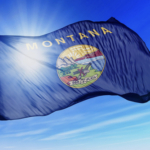 Montana: Young plaintiffs are intervening in a lawsuit challenging the constitutionality of two voting laws passed this legislative session. The groups Forward Montana and Montana Public Interest Research Group are joining others in the lawsuit against Montana Secretary of State Christi Jacobsen. The suit challenges two 2025 laws which cut Election Day voter registration by eight hours and limited the use of student identification for voting. Molly Danahy, litigation director for Upper Seven Law, is the attorney representing the Montana youth plaintiffs. “Young voters, especially new voters, are more likely to use or rely on Election Day registration,” Danahy explained. “Because they may be becoming eligible or deciding to vote later in the process than people who are more practiced or regular voters.” Montana’s Supreme Court last
Montana: Young plaintiffs are intervening in a lawsuit challenging the constitutionality of two voting laws passed this legislative session. The groups Forward Montana and Montana Public Interest Research Group are joining others in the lawsuit against Montana Secretary of State Christi Jacobsen. The suit challenges two 2025 laws which cut Election Day voter registration by eight hours and limited the use of student identification for voting. Molly Danahy, litigation director for Upper Seven Law, is the attorney representing the Montana youth plaintiffs. “Young voters, especially new voters, are more likely to use or rely on Election Day registration,” Danahy explained. “Because they may be becoming eligible or deciding to vote later in the process than people who are more practiced or regular voters.” Montana’s Supreme Court last
 North Dakota: The U.S. Supreme Court agreed to prolong a temporary freeze on North Dakota’s legislative district map — hinting that the justices may be interested in hearing a tribal voting rights case against the state.The Supreme Court’s order, issued July 24, prevents an appellate court’s judgment in a landmark North Dakota redistricting lawsuit from taking effect until the higher court makes a final decision in the case. The suit, filed in 2022 by the Spirit Lake Nation, Turtle Mountain Band of Chippewa and three tribal citizens, accuses a legislative district map adopted by North Dakota lawmakers in 2021 of unlawfully diluting the power of Native American voters. The judgment would do two things: make it so that private citizens in the 8th Circuit can’t sue under a law that bans racially discriminatory voting practices, and pave the way for North Dakota’s district lines to revert back to the 2021 map. Now that the Supreme Court has stepped in, voters in the seven 8th Circuit states will still be able to bring lawsuits under the statute, known as Section 2 of the Voting Rights Act, at least until it decides the North Dakota case. The order also likely means North Dakota’s district lines will remain the same for the 2026 election cycle. The current map — which puts the Turtle Mountain and Spirit Lake reservations in the same district — was adopted in 2024 after the tribes convinced U.S. District Court Judge Peter Welte that the 2021 map was discriminatory. The plaintiffs asked the U.S. Supreme Court to freeze the current map in place as they prepare to appeal the 8th Circuit’s decision to the high court. July 24’s order solidifies a shorter stay on the judgment the Supreme Court issued last week.
North Dakota: The U.S. Supreme Court agreed to prolong a temporary freeze on North Dakota’s legislative district map — hinting that the justices may be interested in hearing a tribal voting rights case against the state.The Supreme Court’s order, issued July 24, prevents an appellate court’s judgment in a landmark North Dakota redistricting lawsuit from taking effect until the higher court makes a final decision in the case. The suit, filed in 2022 by the Spirit Lake Nation, Turtle Mountain Band of Chippewa and three tribal citizens, accuses a legislative district map adopted by North Dakota lawmakers in 2021 of unlawfully diluting the power of Native American voters. The judgment would do two things: make it so that private citizens in the 8th Circuit can’t sue under a law that bans racially discriminatory voting practices, and pave the way for North Dakota’s district lines to revert back to the 2021 map. Now that the Supreme Court has stepped in, voters in the seven 8th Circuit states will still be able to bring lawsuits under the statute, known as Section 2 of the Voting Rights Act, at least until it decides the North Dakota case. The order also likely means North Dakota’s district lines will remain the same for the 2026 election cycle. The current map — which puts the Turtle Mountain and Spirit Lake reservations in the same district — was adopted in 2024 after the tribes convinced U.S. District Court Judge Peter Welte that the 2021 map was discriminatory. The plaintiffs asked the U.S. Supreme Court to freeze the current map in place as they prepare to appeal the 8th Circuit’s decision to the high court. July 24’s order solidifies a shorter stay on the judgment the Supreme Court issued last week.
Opinions This Week
National Opinions: Election security | CISA
Alabama: Accessibility
Arizona: Website hack
California: Election integrity
Colorado: Political violence
Guam: Election administration
New York: Ranked choice voting
North Carolina: Election interference
South Dakota: Ballot measures | Election reform
Washington: Ranked choice voting
Call for Papers and Proposals
Election Science Conference-within-a-Conference: The 2026 Election Science Conference-within-a-Conference (CwC), co-organized by Lisa Bryant (California State University, Fresno) and Joshua Ferrer (American University), is now open for proposal submissions. The CwC will be part of the Southern Political Science Association (SPSA) Annual Meeting, which will be held January 14-17, 2026 in New Orleans, Louisiana. The submission deadline is August 15, 2025. We hope to elicit broad participation from those focused on Election Law, Election Administration, Election Sciences, State and Local Politics, Voting and Voting Rights, Public Opinion, and Public Administration circles. For this CwC, we invite submissions in all areas of election sciences. We encourage submissions from all scholars, including practitioners, researchers in advocacy organizations, those from underrepresented backgrounds, graduate students, and early career scholars. Proposals can focus on the American electoral context, as well as the international or comparative electoral environments and systems. Possible topics include, but are not limited to: public opinion about elections, election administration and procedures, voter confidence, threats to election officials (and their implications), voter disenfranchisement, voting methods and voter experiences, racial/ethnic disparities in access to registration and voting, changes in election laws and election reform, elite rhetoric in how election results are processed and reported, voter turnout and behavior. The CwC will include approximately 10-12 panels of 4-5 papers each, with all panels likely occurring over 1.5 days for ease of attendance (exact dates and times to be announced later). Panel proposals or roundtable proposals are also welcome. If you are part of an organized panel, all papers should submit individually and indicate they are part of a panel. Per the conference organizers, please DO NOT SUBMIT TO THE SPSA CONFERENCE WEBSITE IF YOU ARE SUBMITTING TO THE CWC. This results in papers being double booked at the conference. Please don’t hesitate to reach out to us with any questions at: lbryant@csufresno.edu (Lisa Bryant) or jferrer2017@gmail.com (Joshua Ferrer).
Upcoming Events
EAC Technical Guidelines Development Committee Virtual Working Sessions: The U.S. Election Assistance Commission (EAC) will hold two Technical Guidelines Development Committee (TGDC) Virtual Working Sessions on July 30 and August 8. During these sessions, the TGDC members will discuss the proposed changes to the Voluntary Voting System Guidelines (VVSG) 2.1. Staff from the EAC and the National Institute of Standards and Technology (NIST) will be available for technical questions and support. The working sessions will be live streamed on the agency’s YouTube Channel. These working sessions will build on the discussion from the July 2 meeting of the TGDC. A recording of this meeting is available on the EAC’s YouTube Channel. The TGDC is composed of 14 members jointly appointed by the EAC and the NIST. The committee, which the director of NIST chairs, was established to assist the EAC in developing VVSG in accordance with the Help America Vote Act of 2002. Information about how to watch the livestreams will be made available on the event pages for each working session: August 8, 2025 Working Session #2 When: Aug. 8. Where: Online
Voter Registrars Association of Virginia Annual Conference: When: August 3-6. Where: Roanoke.
Election SATs: Security, Accuracy and Transparency: If you’re a leader on elections policy, this NCSL precon is for you. Join with peers from throughout the nation to share the latest on accuracy, security and access to the ballot. We will have sessions on cybersecurity, primaries, funding, cast vote records, campaign finance, election consolidation and post-election audits. When: Aug. 3. Where: Boston
NASS Summer Conference: The National Association of Secretaries of State will hold its summer conference in Biloxi, Mississippi from August 4-7. Please refer to the NASS website for more information and to register for the event.
National Conference of State Legislatures Summit: NCSL is bringing the Legislative Summit back to Boston! Join us Aug. 4-6 to connect with legislators and staff from across the nation at an event jam-packed with great speakers, eye-opening policy sessions and after-hours experiences at some of Boston’s coolest venues. Help NCSL celebrate its 50th anniversary in style. When: August 4-6. Where: Boston
Oregon Association of County Clerks Annual Conference: When: August 11-14. Where: Klamath Falls.
Michigan Association of County Clerks 117th Annual Summer Conference: When: August 17-20. Where: Mt. Pleasant.
WMCA Annual Conference: When: August 19-22. Where: LaCrosse.
Election Center Annual Conference: The Election Center Annual Conference will be held in Salt Lake City. The conference will run August 20-22 and CERA courses will be offered August 23 and 24. The CERA courses offered will be: Course 5 (Ethics); Course 6 (Communications & Public Relations); and Two renewal courses to be announced. When: August 20 to 24. Where: Salt Lake City.
Protecting the Election: AI and Governance Conference at WashU: Join us for this two-day in-person research and practitioner conference at WashU on October 16-17, 2025, to discuss research regarding AI and governance and how this applies to U.S. elections. Research topics include how chatbots can be used to engage with voters, how social media influences voters, what the electorate knew (or did not know) about the candidates and issues during recent elections, misinformation in elections, rhetoric about election integrity, and AI strategies for the administration of elections. We will also hear from practitioners during the conferences about their experiences with and needs for AI in recent elections and their intentions for future use of AI in elections. When: Oct. 16-17. Where: St. Louis.
Job Postings This Week
electionlineWeekly publishes election administration job postings each week as a free service to our readers. To have your job listed in the newsletter, please send a copy of the job description, including a web link to mmoretti@electionline.org. Job postings must be received by 5pm on Wednesday in order to appear in the Thursday newsletter. Listings will run for three weeks or till the deadline listed in the posting.
Administrative Specialist III (Elections Specialist Lead), King County, Washington – This is an amazing opportunity to be engaged in the election process! The Department of Elections is searching for an energetic and resourceful professional who likes to get stuff done. The Administrative Specialist III in the Elections Department combines an exciting environment with the opportunity to cultivate talents and apply a variety of skills. The ideal candidate will thrive in an innovative, fast-paced environment and will not hesitate to roll up both sleeves, work hard, have fun, and get the job done. This position will lead processes, projects, and people within the Signature Verification and Alternate Format work area of Ballot Processing. This will include leading, coaching, mentoring, and training temporary and regular staff. Leads may also provide assistance and/or participate in long-term cross-training in multiple work areas to meet organizational agile efforts. This is a great opportunity for a person with strong communication and interpersonal skills. Who We Are: King County Elections (KCE) manages voter registrations and elections for more than 1.4 million voters in King County, one of the largest vote-by-mail counties in the United States. KCE’s mission is to conduct accessible, secure, and accurate elections. As a leader in providing inclusive elections, KCE is focused on core values of accuracy, equity, integrity, service, teamwork, and transparency. The team at KCE is committed to ensuring all King County voters can get registered, cast their ballot, and make their voices heard. Salary: $29.77 – $37.87 Hourly. Deadline: August 4. Application: For the complete job listing and to apply, click here.
Administrative Specialist, King County, Washington – The Department of Elections is searching for energetic and resourceful professionals who like to “get stuff done”. The Administrative Specialist II positions in the Voter Services Department combines an exciting, fast-paced environment with the opportunity to cultivate talents and apply a variety of skills. The ideal candidate will have a desire to help ensure the democratic process through public service. They will thrive in an innovative environment and will not hesitate to roll up both sleeves, work hard, have fun, and get the job done. Job Duties: Provide excellent customer service to internal and external customers in person, via telephone, and via e-mail by processing voter registrations, communicating election program information and explaining election procedures, guidelines and regulations. Provide backup support for translation and/or interpreting and proof election-related documents and web materials from English to Chinese (traditional text). This includes but is not limited to voter registration information, letters, and other correspondence, notice of elections, ballot titles, voters’ pamphlet information, candidate statements, ballot measures, etc. to limited English speaking (LES) voters. Perform production-level computer work which includes accurate data entry, retrieving and editing records. Organize and coordinate work activities and assist with providing training and one-on-one instruction to diverse staff. Set up records and file documents in both electronic and paper formats. Review documents for proper format, accuracy, completion, eligibility, and other legal guidelines. Audit work group data entry activities to ensure performance quality and efficiency of work. Utilize spreadsheets, word documents and reports to track and document performance data. Research and resolve questions from staff, citizens and stakeholders. Document and improve work processes, procedures and instructions. Salary: $27.03 – $34.40 Hourly. Application: For the complete job listing and to apply, click here.
Assistant Registrar of Voters, Santa Clara County, California– Under general direction, the Assistant Registrar of Voters supports the planning, organization, and oversight of the County Registrar of Voters Department. This executive leadership position reports directly to the Registrar of Voters and plays a key role in administering and managing departmental operations. The department is responsible for voter registration, the conduct of elections, and related electoral services. The Assistant Registrar of Voters helps ensure that all activities are carried out efficiently, accurately, and in compliance with applicable laws and regulations. This position may assume the responsibility of the Department in the absence of the Registrar of Voters. Salary: $194,184.52 – $249,180.63. Application: For the complete job listing and to apply, click here.
Automatic Voter Registration Policy Specialist, Oregon Secretary of State– In this role you will serve as the primary elections policy specialist to oversee and ensure policy, analysis and systems support for the Automatic Voter Registration (AVR). This position will help ensure the system is compliant with applicable federal and state law. You will provide guidance on ensuring data accuracy and improving automatic voter registration processes. This is accomplished in part by, but not limited to: Policy Analysis and Research: Researching and proposing new policies and changes to existing policies to division management to ensure accuracy, reliability, and compliance of automatic voter registration (AVR). Gathering input from partner state agencies, Secretary of State staff, and county election administrators on AVR process changes and making recommendations on course of action related to AVR. Drafting, reviewing, and updating program related policies, administrative rules, directives and procedure manuals to meet both state and federal regulations. Training and Compliance: Working as principle contact with state and federal agencies to ensure an understanding and compliance of AVR technical factors. Acting as liaison for the Elections Division by creating and conducting remote and in-person training on the AVR process and related Oregon Revised Statutes (ORS) and Oregon Administrative Rules (OAR) for a wide range of stakeholder audiences. Systems Support: Interpreting complex regulations and translating those regulations into business processes, technical solutions, and system requirements. Working with information systems partners, voter registration technical staff, and Elections management team to develop detailed application requirements. Salary: $6,437 – $9,889/month. Deadline: August 3. Application: For the complete job listing and to apply, click here.
Clerk-Recorder/Registrar of Voters, Nevada County, California– The County of Nevada, California is seeking an experienced, community-oriented Clerk-Recorder/Registrar of Voters (ROV) to oversee the Clerk, Recorder, and Election operations in a county known for its engaged and politically diverse electorate. This is an elected position; however, due to a vacancy, the Board of Supervisors must by law appoint someone to serve the remainder of the term. While the Board hopes the appointee will run in the June 2, 2026, primary election, leading to the November 3, 2026, general election, it is not a requirement. Residency in Nevada County and voter registration are mandatory. This role offers a unique opportunity to enhance public trust in the electoral process by advancing transparency, accessibility, and innovation. The ROV will lead a dedicated team, manage a $3.7 million budget, and collaborate closely with County leadership and the Board of Supervisors to ensure accurate and efficient operations and an inclusive election process. The ideal candidate is a collaborative, hands-on leader who values professionalism and humility, embraces the rural lifestyle, and is eager to engage with the community. Nevada County offers small-town charm, a strong sense of connection, and exceptional outdoor recreation—making it an ideal place to live, lead, and serve. Serve democracy in the heart of the Sierras—apply today! Salary: $188,453.40. Deadline: August 7. Application: For the complete job listing and to apply, click here.
Community Engagement Coordinator, North Charleston, South Carolina– Partner with the Community Engagement Manager to identify and expand non-partisan community relationships. Cultivate connections with local businesses and civic organizations to boost visibility and support. Solicit and analyze community feedback to enhance outreach strategies. Create brochures, flyers, presentations, and digital content to educate the public about elections and voting procedures.Collaborate with the Marketing and Communications Manager to maintain clear, consistent, and timely messaging across platforms. Manage and update the outreach section of the agency’s website. Deliver presentations and training during outreach events. Plan and coordinate mid-scale public events such as National Voter Registration Day and poll worker appreciation initiatives. Represent BVRE at outreach events, tabling opportunities, and community meetings. Track outreach activity and report on engagement metrics and outcomes. Support special projects including the “I Voted” sticker contest, Adopt a Polling Location, and poll worker recruitment. Research best practices to enhance and expand outreach programming. Assist in maintaining a centralized repository of outreach materials and resources. Salary: $50,440 – $66,060. Application: For the complete job listing and to apply, click here.
Election Analyst, Charleston County, South Carolina– Are you a detail-oriented professional with a passion for public service and a knack for technology? Join us as an Election Analyst and play a vital role in ensuring the security, efficiency, and accuracy of elections in our community. At the Board of Voter Registration and Elections, we are not just managing elections—we’re shaping the foundation of democracy. As an award-winning office known for our commitment to excellence and innovation, we invite you to be part of a team that is redefining what it means to serve the public. Our mission is to daily serve the Charleston County voting constituency with Vigilance, Objectivity, and Transparency in a manner that promotes due diligence Excellence in all aspects of Elections Management. Why Join Us: 1. Trusted Stewards of Democracy: We lead the way in secure, accessible, and transparent elections, earning statewide and national recognition for our performance. 2. Frontline Impact: As an Election Analyst, your work will directly impact how voters experience democracy—from the reliability of equipment to the confidence in results. 3.Culture of Innovation: We’re constantly improving election systems, training programs, and precinct operations to ensure our voters get the best experience possible. Salary: $45,052 – $58,988. Application: For the complete job listing and to apply, click here.
Election Specialist, Candidate Services, Palm Beach County, Florida– This position is responsible for the management and execution of services provided to candidates, political committees, electioneering communication organizations, political parties, community development districts, and special taxing districts. This includes establishing and maintaining an organized system for managing the required forms and records associated with filing and qualifying for office, candidate petitions, campaign finance reporting, financial disclosures, initiative petitions, and other related activities. Candidate Services staff must be organized and personable with a great attitude, be able to work well in a team environment, and meet deadlines under pressure. Excellent work ethic, including consistent performance, integrity, reliability, and attendance, is a must. Must be detail-oriented, be able to handle simultaneous projects, and be a self-starter. Salary: $21.63 – $24.04. Application: For the complete job listing and to apply, click here.
Elections Assistant, Clallam County, Washington– Clallam County is seeking a detail-oriented Elections Assistant to support the essential functions of the Elections Division. Acting with the authority of a Deputy Auditor, this position helps conduct elections, maintain accurate voter registration records, and ensure timely preparation of ballots, voter pamphlets, and election equipment in compliance with Washington State laws and county procedures. The Elections Assistant also assists with ballot processing, jurisdictional updates, operating the ballot tabulation system, and training election workers. This role plays a vital part in ensuring fair, secure, and efficient elections. Salary: $24.36 – $29.68 Hourly. Deadline: Aug. 4. Application: For the complete job listing and to apply, click here.
Elections Filing Manager, Arizona Secretary of State’s Office– The Elections Filing Manager oversees the Division’s filing operations and works with other Elections Manager(s) and the Deputy State Election Director to ensure the Division’s compliance with state and federal laws and regulations relating to initiative, referenda, recalls, new party and candidate nomination petition processing, E-Qual, petition circulator registration, officeholder financial disclosures, campaign finance and lobbying filings. The EFM manages Division staff and interns, and communicates frequently with counties, cities/towns, officeholders, candidates, and the regulated community. Manages the day-to-day operations of the Elections Filing Team. Responsible for managing staff, projects, and operations and ensuring compliance related to initiative/referenda/recall/new party/candidate nomination filings and processing, petition circulator registration, official events such as the official canvass and Electoral College, campaign finance, E-Qual, officeholder financial disclosures and lobbying. Responsible for ensuring related handbooks and forms are created/updated timely and accurately. Responsible for the filing internship program. Act as project manager for election related IT systems including but not limited to Beacon, Candidate Portal, E-Qual, EMS, Circulator Portal, Lobbyist Portal and the Petition Management Services System. Oversee the development of all election related IT systems, provide guidance to IT regarding the business requirement documents for election related IT systems and work with staff to provide specifications/guidance for IT development. Ensures legal compliance and functionality and facilitate on-going positive user experience. Provide research and confirmation of the statutory requirements of filings, conduct QA tests on the election related IT systems and software. Assists with customer service needs on topics such as E-Qual, campaign finance, petition filings and financial disclosures. Helps create and maintain accurate content for the website in areas specific to their role. Application: For the complete job listing and to apply, click here.
IT Assistant Manager, Palm Beach County, Florida– The Assistant IT Manager plays a supportive role in the smooth operation of the IT department, ensuring that both the technical infrastructure and the team are aligned with the organization’s goals. This position involves collaborating closely with the Election Technology Director to oversee the implementation of technology solutions that meet the needs of the organization. The Assistant IT Manager helps maintain an efficient and effective IT environment. Oversee daily operations of the IT department, including help desk operations and performance, troubleshooting issues, and ensuring efficient workflow. Hold department meetings and provide weekly performance summary. Manage IT projects under the direction of the Election Technology Director, ensuring timely completion, budget requirements, and organizational needs. Enforce IT policies and procedures to ensure data security, network access, and system availability. Assist in the management of IT staff by developing skills, coaching, and communicating job expectations. Coordinate vendor renewals, assist with IT budget development, and manage grant applications. Evaluate and assist in maintaining the organization’s disaster recovery and business continuity plans for IT. Assist with IT Public Records requests research and fulfillment. Assist the Election Technology Director in all facets of IT operations. Lead projects and mentor team members. Application: For the complete job listing and to apply, click here.
Physical Security Specialist, Palm Beach County, Florida– This position is responsible for administration of the physical security programs in a manner consistent with Supervisor of Elections Office policies, procedures, quality standards, and applicable local, state, and federal regulations. These programs include conducting facility security risk assessments, assisting with access control, monitoring alarms and CCTV systems, and providing security related training. Must be organized and personable with a great attitude, be able to work well in a team environment, and meet deadlines under pressure. Excellent work ethic, including consistent performance, integrity, reliability, and attendance, is a must. Candidate must be detail-oriented and understand the importance of security and safety for all. Must be available 24/7 365, be able to handle simultaneous projects, and be a self-starter. Application: For the complete job listing and to apply, click here.
Precinct Manager, Charleston County, South Carolina– Are you driven by a passion for democracy and civic engagement? Join the Board of Voter Registration and Elections as a Precinct Manager and play a critical role in delivering seamless, fair, and accessible elections. Key responsibilities: Poll worker recruitment and management; Polling location management; Liaison and community engagement; Support for election operations on Election Day and early voting; and Team leadership. The Board of Voter Registration and Elections is an award-winning organization dedicated to excellence in electoral processes. Our mission is to daily serve the Charleston County voting constituency with Vigilance, Objectivity, and Transparency in a manner that promotes due diligence Excellence in all aspects of Elections Management. We are committed to continuous improvement, innovative practices, and exceptional service to our community, ensuring every voter’s voice is heard. Salary: $68,140 – $89,252. Application: For the complete job listing and to apply, click here.
Senior Elections Supervisor, Placer County, California– The Placer County Clerk-Recorder-Elections Office has a current vacancy for a Senior Elections Supervisor. The Office is looking for someone with experience in the development, supervision, and administration of elections programs. The ideal candidate will have supervised in an elections office or similar agency that emphasizes cooperation, accountability and transparency and has the ability to communicate effectively with management, staff, other county departments, jurisdictions and the voters of Placer County. To learn more about the Elections Division of the Clerk-Recorder-Elections Office please click here. In addition to the minimum education and experience, the ideal candidate will possess experience and vision in the following areas: State and federal election laws; Voting systems; General operating policies and functions of the California Secretary of State’s Office; Best practices and current trends in successful election administration, community education and outreach programs; Principles and techniques of effective employee supervision and development, training, management practices and public administration. Salary: $69,056.00 – $86,195.20/year. Application: For the complete job listing and to apply, click here.
Voter Registration and Absentee Manager, Charleston County, South Carolina– Are you driven by public service and committed to ensuring the accuracy of voter registration? Join us as the Voter Registration and Absentee Manager and lead a team dedicated to upholding the integrity of our processes. Welcome to the Board of Voter Registration and Elections, where we are not just an agency, but a dynamic force committed to excellence in democracy. As an award-winning organization, we pride ourselves on our relentless pursuit of improvement to better serve the voters in our community. This role is pivotal to ensuring secure, accurate, and accessible voter registration and absentee voting services. Salary: $70,000.00 – $82,000.00 Annually. Application: For the complete job listing and to apply, click here.
Voter Registration Management, Tarrant County, Texas–Responsible for directing, administering, managing, and coordinating all activities of Voter Registration and GIS. Oversees area programs and functions including, but not limited to, administration of the voter registration and elections management database systems, geographic information and redistricting assignment (GIS) system, voter registration document imaging system, Volunteer Deputy Registrar program, and candidate financial filings (Title 15). Manages department responses to public information requests and voter registration data requests; provides certified election lists, and interprets Federal, State, and local election law. Assists in the development and monitoring of the Election Department’s fiscal budget and the State (Chapter 19/T73) annual operating budgets. Plans, organizes, implements, and evaluates Voter Registration area programs and aids in developing policies and procedures. Salary: $74,431.76 – $81,875.04. Deadline: Aug. 2. Application: For the complete job listing and to apply, click here.
Voter Services Clerk, Seminole County, Florida – The Voter Services Clerk serves as the primary customer service representative for the Seminole County Supervisor of Elections Office. This position is responsible for the accurate maintenance and entry of voter registration information, ensuring the integrity and confidentiality of voter data, and providing essential assistance to voters, including answering inquiries and processing voter-related documents. The Clerk will also be involved in various clerical and administrative tasks associated with voter services, ensuring compliance with applicable state and federal election laws. Responsibilities include processing new voter registrations, updates or changes to existing registrations, vote-by-mail ballot requests, and returns, as well as petition verifications and other voter record-related tasks, providing accurate voter registration and election information to the public in person, by phone, or via mail, in accordance with Florida state laws, regulations, and procedures, conducting research to resolve issues related to voter registration records, utilizing sources both within the voter database and external government websites or online resources, ensuring the accuracy and completeness of voter registration records by verifying information, validating signatures on candidate and initiative petitions, maintaining and update street maintenance files to ensure an up-to-date and accurate residential address database for Seminole County. Salary: $17 – $22 Hourly. Application: For the complete job listing and to apply, click here.
Marketplace
electionline provides no guarantees as to the quality of the items being sold and the accuracy of the information provided about the sale items in the Marketplace. Ads are provided directly by sellers and are not verified by electionline. If you have an ad for Marketplace, please email it to: mmoretti@electionline.org